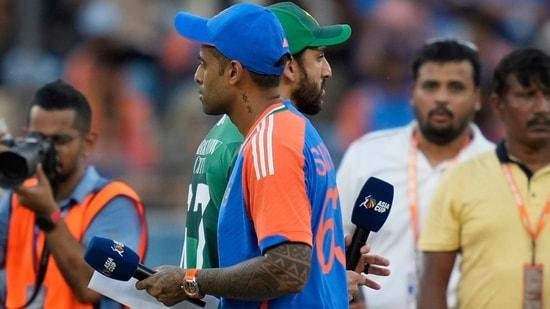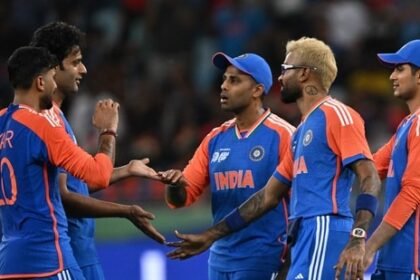Tensions Rise as India and Pakistan Captains Skip Handshake at Asia Cup 2025
In a moment that captured the attention of cricket fans worldwide, Indian captain Suryakumar Yadav and his Pakistani counterpart Salman Agha notably refrained from the customary handshake following the toss at the Asia Cup 2025 match held at Dubai International Stadium. This incident, which unfolded on Sunday, has been interpreted as a reflection of the ongoing political tensions between the two nations, particularly in light of the recent Pahalgam terror attack that claimed 26 lives in April.
A Gesture of Discontent
The absence of a handshake between the two captains is more than just a breach of etiquette; it symbolizes the strained relations that have historically characterized India-Pakistan encounters. While handshakes are not mandated by the rules of cricket, they have become a customary gesture of sportsmanship. The lack of this gesture during the toss raised eyebrows and sparked discussions among fans and analysts alike.
After Pakistan won the toss and opted to bat first, both captains submitted their team sheets to match referee Andy Pycroft. They then engaged briefly with TV commentator Ravi Shastri before returning to their respective dugouts, avoiding any eye contact. This behavior was not an isolated incident; a source from the Board of Control for Cricket in India (BCCI) revealed that Suryakumar had also skipped the handshake during the previous match against the UAE, indicating a broader pattern rather than a specific snub aimed at Pakistan.
Historical Context
The backdrop of this incident is steeped in a long history of conflict and rivalry between India and Pakistan, both on and off the cricket field. The Pahalgam attack, which occurred earlier this year, heightened tensions and led to a military standoff between the two nations. In response to the attack, India implemented a new sports policy that prohibits bilateral events with Pakistan, travel to the country, and hosting Pakistani athletes. However, multi-nation events like the Asia Cup remain unaffected by these restrictions, allowing for continued competition in a neutral setting.
The Pre-Tournament Press Conference
The drama surrounding the handshake was not limited to the match itself. Earlier in the week, during a pre-tournament press conference, social media buzzed with claims that Suryakumar and Salman had avoided each other, failing to shake hands at the end of the event. However, a subsequent video surfaced showing Salman waiting for Suryakumar after the conference, offering a handshake that was ultimately accepted. This incident highlights the complexities of sportsmanship in a politically charged atmosphere.
Focus on the Game
Despite the surrounding tensions, both teams entered the Asia Cup with a focus on performance. Prior to the match, the Indian camp emphasized the importance of setting aside emotions and concentrating on the game. Both India and Pakistan had secured victories in their opening matches of the tournament, setting the stage for a highly anticipated clash.
The Bigger Picture
The significance of this match extends beyond the cricketing realm. It serves as a microcosm of the larger geopolitical landscape between India and Pakistan. Cricket has often been a platform for both nations to express their national pride, and the absence of a handshake can be seen as a reflection of the current state of relations. The cricket field, while a space for competition, is also a stage where political narratives play out, often influencing the players’ interactions.
Conclusion
The handshake snub between Suryakumar Yadav and Salman Agha at the Asia Cup 2025 has reignited discussions about the intersection of sports and politics. As both nations continue to navigate their complex relationship, the cricket field remains a significant arena for expression. While the players may strive to focus on the game, the weight of history and current events looms large, reminding us that in cricket, as in life, gestures often carry deeper meanings.











